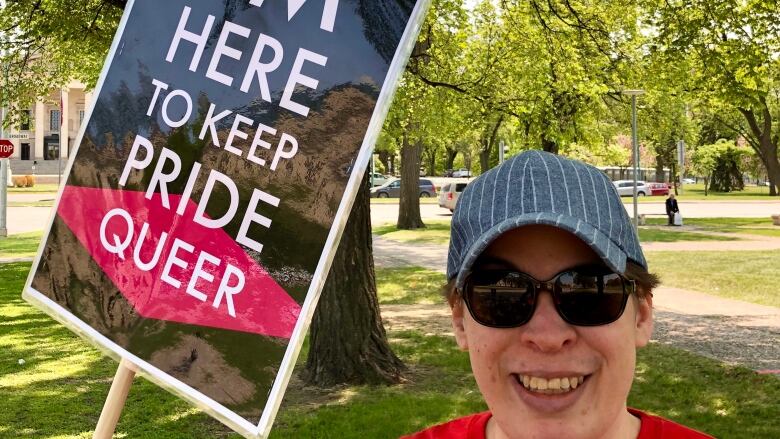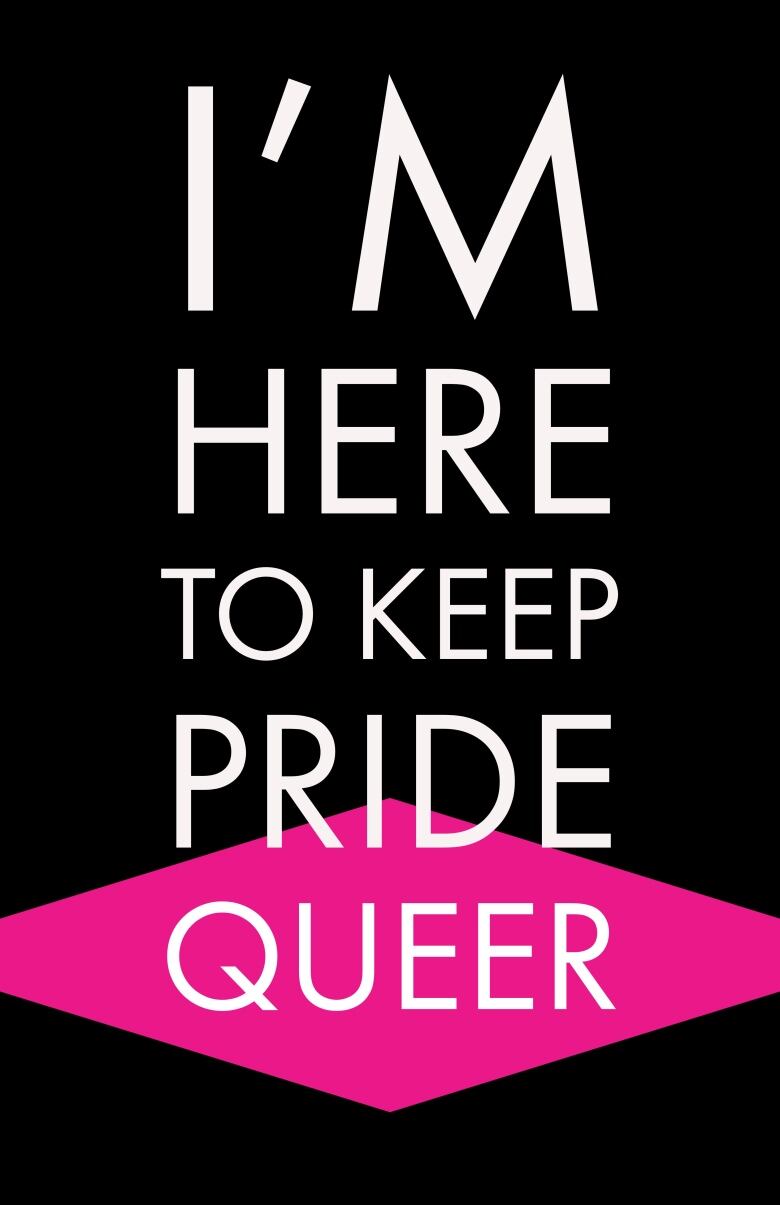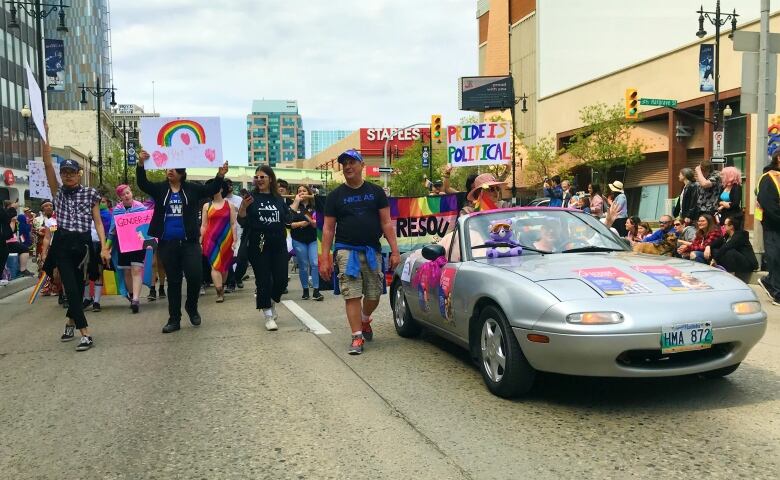Keep Pride queer: Using euphemisms like 'Gender, Sexual and Relationship Diverse' is misguided
Intentions might be good, but change has troubling systemic and political implications

Yesterday's Pride parade in Winnipeg may have been my last.
I carried a sign that read "I am here to keep Pride queer." The message was as much for the organizers as it was for the crowd.
As always, I was moved and inspired by the thousands of people who boldly marched and the tens of thousands of cheering people in the crowd.
But after 20 years of marching in Pride parades in cities across the country, I am not feeling very proud of Pride.

I am a queer person. A lesbian. A dyke. I call myself many things, but contrary to what Pride Winnipeg would have you believe, I am not "Gender, Sexual and Relationship Diverse" (sic).
Pride Winnipeg announced last year that they would stop using the words two-spirit, lesbian, gay, bisexual, trans, and queer, and replace them with the vague and grammatically incorrect Gender, Sexual and Relationship Diverse (GSRD).
They suggested in a 2018 Pride Guide article called "What's in a name?" that GSRD is more inclusive, and that they are "positioning gender, sexuality and relationships as broad categories, rather than specific identities."
Pride Winnipeg is one of a small number of Canadian Pride organizations to replace 2S-LGBTQ with euphemisms like GSRD. Their intentions might be good, but the move is misguided, and it has troubling systemic and political implications.
People in positions of power follow Pride's lead. The Mayor of Winnipeg, for example, did not name 2S-LGBTQ people at all in his Pride remarks this year, referring to GSRD instead.
Why does it matter, you ask? Well, words and identities matter. And as Canadian voters are fiercely polarized and swerving to the right, this is a terrible time to erase decades of identity recognition built by queers who have politically mobilized under the 2S-LGBTQ banner.
On the 50th anniversary of the Stonewall riots an event led by trans women of colour, a riot against police brutality and discrimination, and the inspiration for Pride protests and parades that have emerged over the past 50 years words matter now as much as ever.
The words we choose say a lot about how we expect others to treat us, and how we see ourselves.
Where did GSRD come from?
Pride Winnipeg's GSRD seems to be an adaptation of "Gender Sexuality Relationship Diversity," a clinical term used by mental health providers seeking to flag their practices as inclusive for potential clients.
The history of queers and psychiatry/psychology is a complicated one. Diagnoses and treatments have long been used as weapons against queer people. An egregious example is trans people needing to be diagnosed with gender dysphoria to access hormones (although that is hopefully changing).
While the field has made strides to be less oppressive of queers, it is ridiculous to be taking cues from therapists about what to call ourselves.
Pride Winnipeg wrote in last year's Pride Guide that the term GSRD would help people who "do not have a name or word for how they identify, but are aware that their experience does not mirror "normative ideas."
The way that GSRD is employed makes the division clear.
It centres heterosexuality as the norm, and everyone else as diverse.

Rather than identifying ourselves with labels that describe who we are, GSRD identifies us by who we are not. Why, at this moment in our history, would we decide to disassociate ourselves from queer identities and frame ourselves as vaguely other?
Palatable Pride
The GSRD move comes in the midst of a battle over the integrity of Prides in many cities. As some queer people have made gains (more often white, cisgender people), the divide between assimilationist and liberationist politics intensifies.
There are people who believe in assimilation. They say they are just like straight people except for their sexual orientation. Their goal is broad acceptance (think Ellen DeGeneres and Neil Patrick Harris).
For the most part, assimilationists have represented queer communities in media and public policy. They have no interest in challenging North America's patriarchal, capitalist status quo, and it makes them attractive spokespeople.
Liberationists have more progressive views. They challenge patriarchy, capitalism, racism, misogyny and the gender binary in queer communities and beyond, and are more likely to say that they are not at all like straight people. Think Black Lives Matter and Against Equality. And think of the people behind the Stonewall riots in 1969.
With broader acceptance, Pride celebrations have become enormous money-makers for corporations and cities. It is no coincidence that as the dollars roll in, the sexuality and protest elements of Pride have disappeared. While Pride Winnipeg claims to have introduced this grammatically incorrect, heterosexuality-centring term for the betterment of the community, I just don't buy it.
If this was really about having a bigger umbrella, why wouldn't organizers use the word queer, which activists have been using for 30 years to describe a population that is sexually, gender and relationship diverse, and also demands political and cultural change?
I would argue that it is because using GSRD is not about having a broader umbrella. It is the next step in sanitizing Pride.
Whether intended or not, replacing the alphabet soup that represents queer identities is perpetuating invisibility and shame. It is apologizing for our differences and insisting we are just like everybody else except for this one thing that Pride won't even name.
It is begging for acceptance instead of celebrating our beautiful, sexy, hegemony-busting queerness.
If Pride is to continue, it must be loud, proud and radical. It must include all queer people, but not by leaving our identities and our politics behind.
We must keep Pride queer. Otherwise, what is the point?












_(720p).jpg)


 OFFICIAL HD MUSIC VIDEO.jpg)
.jpg)



























































































